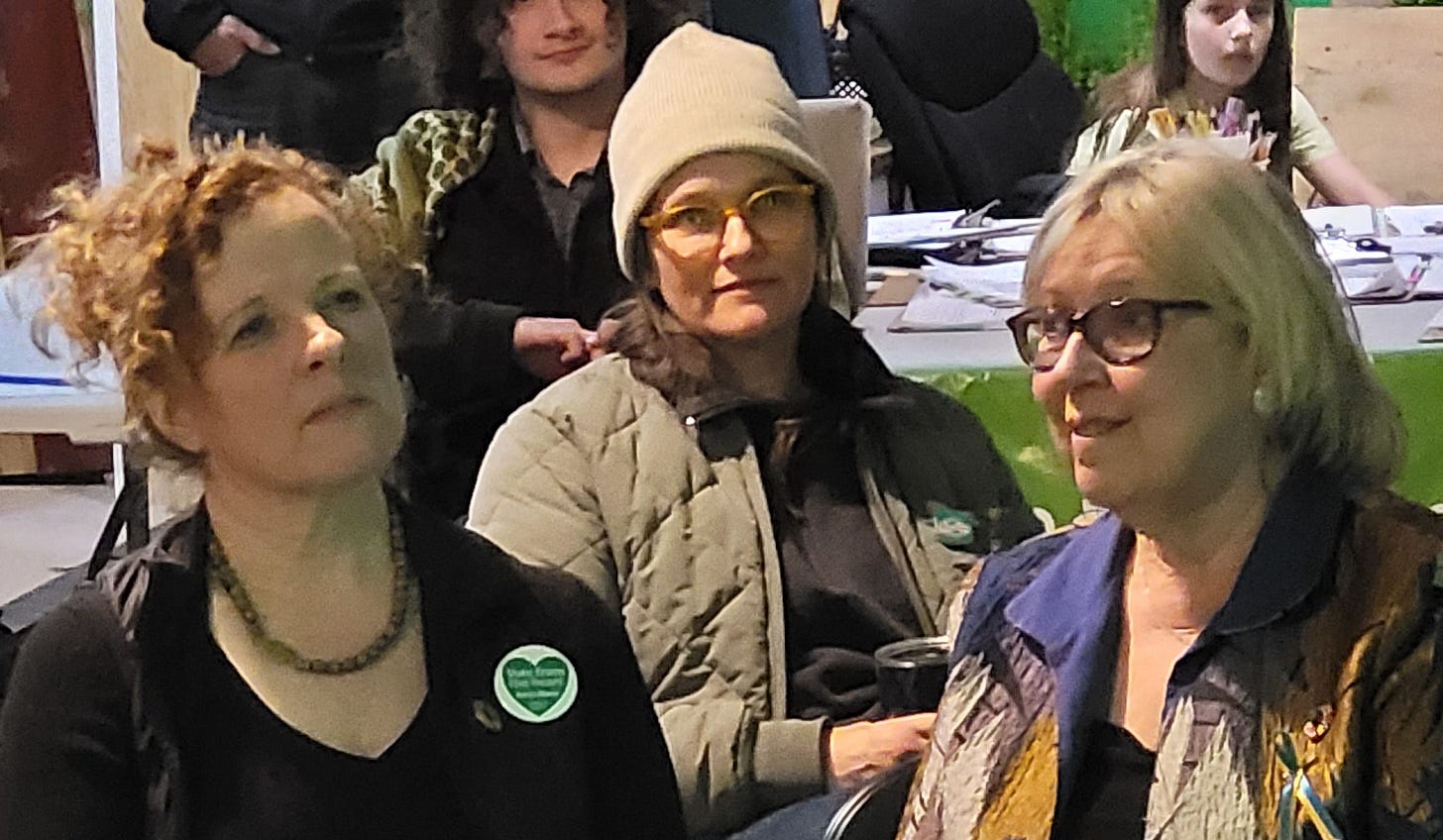Strategic Voting
At what point and in what way should voters reconsider an 'Anybody But the Conservatives' campaign?
Last night (April 7th) I went to a campaign rally where the local Green candidate (Anne-Marie Zajdlik) and the national leader (Elizabeth May) talked about how people should be voting in the upcoming election (April 28th). The word on the street is that in Guelph the race has narrowed down to just two candidate—Zajdlik and Dominique O’Rourke (the Liberal), with the Conservatives running a forlorne-hope parachute candidate from Brampton (Gurvir Khaira), and the NDP an unfunded local (Janice Folk-Dawson). This is an interesting election and at the time I’m writing this post, it’s 20 days away from the vote.

I’ve never seen such a huge turnaround in polling. Before the election was called the smart money was on the Conservatives with Pierre Poilievre becoming the next Prime Minister. That lead is long gone now.

As you can see, popular support for the Liberals has gone from the low 20% in January to over 40%. At the same time, Conservative support has dropped from around 45% to under 40%. Some of the increase for the Liberals has come at the expense of the Conservatives, but most of it seems to have been at the expense of the NDP, Greens, and Bloc Québécois. This is disturbing—and, I think, unnecessary. That’s because I think we are now safely in a situation where people don’t have to vote Liberal out of fear that an incompetent, ideologically-driven, man-child will take over Canada and run it into the ground.
Voting ‘Efficiency’
If people just look at the national popular vote, they’d be excused for thinking that people shouldn’t be complacent about the outcome. But if you dive into the details, it’s actually not as close as you might think. That’s because of what political scientists call the ‘efficiency’ of the Liberal vote versus the Conservative. To understand this, it’s necessary to break down the percentage of support by province.
Voting ‘efficiency’ is all about how a political party takes advantage of a critical flaw in our electoral system. In First Past The Post (FPTP) parties don’t get as many seats in Parliament as they get votes in the election. Instead, it all comes down to local races in individual ridings. And it’s not about winning the majority of votes, it’s about getting at least one more than all the others. And the closer a party gets to having just one more vote than their nearest rival in all the individual electoral districts, the more ‘efficient’ it is.
According to this state of affairs the Conservative vote is a lot less efficient than the Liberal one—mainly because it is mostly concentrated in rural Alberta, Saskatchewan, Manitoba, and Ontario. In these areas Conservatives routinely get a lot more votes than their nearest rivals. But these extra votes would be much more useful for the party if they were spread to other ridings where the Liberals win their seats by just getting a few votes more than their closest rival.
That’s why even though the Conservatives are projected to be only about 7 percentage points behind the Liberals in the popular vote, they are also projected to be behind by 20 percentage points behind in terms of elected MPs. And since all it takes for a party to form a majority government is 172 seats, this means that the Liberals seemed to be headed for a huge majority.
What this all means to me is that while I supported an ‘Anybody But the Conservatives (ABC)’ voting strategy when it looked like the annoying man-child controlling the Tories was in front, I now support a different voting strategy. Now the big danger I see is the complete annihiliation of both the NDP and Greens.
Take a look at those seat projections for both the NDP and Greens—they look like they are both going to be destroyed by a huge red wave.
That’s because Poilievre has managed to create a very effective ABC campaign by appearing to be a Canadian copy of Donald Trump. He did this by aggressively campaigning to the ‘tinfoil hat’ crowd—the so-called ‘Maple MAGA’. (This included actually handing out doughnuts to the knuckle-heads who occupied Ottawa back in 2022.) This has led hordes of voters to hold their noses and vote Liberal because Carney and his team seem much, much more competent than the Maple Maggats and Milhouse.

Removing the NDP and Greens from the House isn’t necessary anymore. Indeed, it never was. But to understand that, people have to be a lot more plugged-into how their individual riding works. In many districts it probably does come down to the Libs and Cons. But as I pointed out at the beginning of this post, in Guelph the race was always going to be between Greens and Liberals—just like how in the last provincial election it was between Greens and Conservatives. (The Green actually won the riding with the highest percentage of votes of any candidate of any party.)
If the Conservatives and NDP already admit through resource allocation that they know they probably aren’t going to win in your riding, and it’s pretty clear that the Liberals are going to win a thumping big majority anyway, then it’s time for people to suspend the ABC and vote for a progressive candidate that really has a chance of winning. This should be happening in all the other ridings where the race is between the Libs and Greens, or, the Libs and the NDP—and the Conservatives are a distant third. And Guelph is one of these ridings where you can vote Green without helping Milhouse!
If, however, your riding is one where the Cons could conceivably win and the Libs have the best chance of beating them—then by all means, stick to the ABC voting strategy! In politics ‘the perfect is the enemy of the good’, and in a choice between Poilievre and Carney I’ll take Carney over Milhouse any day of the week!
Party Discipline and the Decline of Democracy
Another point that needs emphasis.
I’ve heard a lot of folks say that the liberal candidate, Dominique O’Rourke, is just as good a person as the Green, Anne-Marie Zajdlik. I’ve interviewed both and am inclined to say the same thing. But I want to draw reader’s attention to a very significant difference between the situations the two find themselves in—and that’s why I say we need to elect both Greens and Dippers in this election.
If we elect Dominique O’Rourke to Ottawa, we won’t get representation by her in the Commons. Instead, she is going to undergo a personality transplant and will instead become a clone of the chief of staff from the Prime Minister’s Office (PMO). That’s because the mainstream parties (including, alas, the NDP) have an internal culture that effectively takes all the power of MPs away from them and hands it over the appointed staff of the party leader.
It’s so bad that I’ve heard Elizabeth May mention hearing a past Guelph Liberal MP wrily complain about people handing him slips of paper to tell him how to vote. In contrast, the Greens do not have a mechanism for disciplining a candidate as long as they still adhere to the values of the party. This means that if Anne-Marie gets elected she will be able decide for herself what she wants to say and do while in Parliament. Dominique—well, no doubt she will be very nice robot when marches to the orders of the PMO.
I’m not saying that the Greens are all sweetness and light. But at this stage of their development they still really tend to believe that their elected officials shouldn’t be subjected to total control by either the leader or his appointed staff. And if we are going to preserve some semblance of democratic decision-making in our country, voters of good will need to use any opportunity possible to reward good behaviour and punish bad. Voting for the non-robotic candidate is one way of doing this.
Remember the Electoral Time Frame!
We’re still more than two weeks away from the election, so I think it’s important for voters to remember that it’s not too late for people to reconsider their commitment to the Anyone But the Conservatives voting strategy. If you live outside of Guelph, take a good look at the situation. Talk to the people in your life who tend to view the world objectively instead of through ideology, and, who have some understanding of their local political landscape. If you think that your local progressive candidate has a shot at winning while the local Conservative does not, then consider voting for her instead of the Liberal.
The national polls help you look at the big picture, but the local situation can be very different. It would be a catastrophe if the Conservatives win, but it would still be a shame if the Liberals win by wiping out the smaller, progressive voices in Parliament.






The worst thing is a vote for those ideological vacant Greens. Are they liberals or some form of neo conservative mash potato head thinking? Just look at those wishy washy German Greens. First they were anti nuke, anti war and now they are a bunch of pro nuke warmongering neo nazis.They will flip on a dime like the NDP, a product of empty headedness lacking an identifiable ideological foundation. Don't wast your vote. Better stay home.